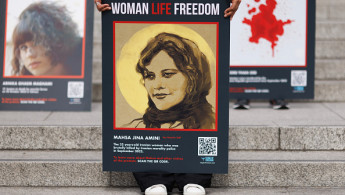Iran upping repression of women 2 years after Amini's death: UN experts
UN experts accused Iran on Friday of "intensifying" its repression of women two years after Mahsa Amini's death in custody, which sparked nationwide protests, including an apparent pattern of sentencing women activists to death.
Amini, 22, was an Iranian Kurdish woman who died three days after her arrest in Tehran in September 2022 for allegedly breaching Iran's dress code which requires women to wear a headscarf.
Two years on, "Iran has intensified its efforts to suppress the fundamental rights of women and girls and crush remaining initiatives of women's activism", the independent UN fact-finding mission on Iran warned in a statement.
The UN Human Rights Council appointed the experts to investigate the deadly crackdown on nationwide protests that rocked Iran after Amini's death.
"Although mass protests have subsided, the unabated defiance of women and girls is a continuous reminder that they still live in a system that relegates them to 'second class citizens'," said the experts, who do not speak on behalf of the United Nations.
In a fresh update, they said repression had stepped up noticeably since April.
State authorities had "increased repressive measures and policies" through the so-called "Noor Plan", which encourages sanctioning rights violations against women and girls who flout the mandatory hijab, they said.
"Security forces have further escalated pre-existing patterns of physical violence, including beating, kicking, and slapping women and girls who are perceived as failing to comply with the mandatory hijab laws and regulations," the team said in a statement.
They also warned that state authorities had enhanced surveillance for hijab compliance, including in private spheres like vehicles, and with a range of tools, including drones.
At the same time, a new "Hijab and Chastity" bill, which is in the final stages of approval, provides for harsher penalties for women who do not wear the mandatory hijab -- including soaring fines, long prison sentences and travel bans.
In their statement, the experts expressed particular concern about "an apparent new pattern of sentencing to death of women activists... following their convictions for national security offences".
"Over the last two years, the death penalty and other domestic criminal law provisions, in particular those related to national security, have been used as instruments to terrorise and deter Iranians from protesting and expressing themselves freely," they said.




 Follow the Middle East's top stories in English at The New Arab on Google News
Follow the Middle East's top stories in English at The New Arab on Google News


